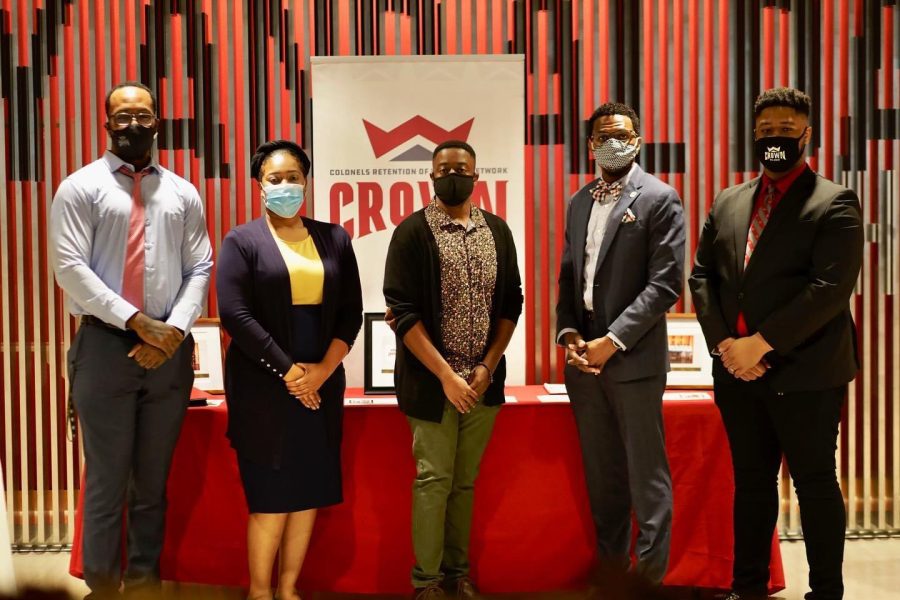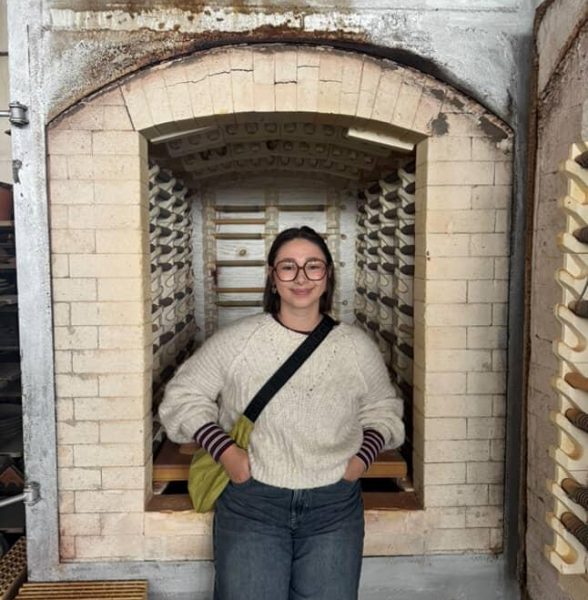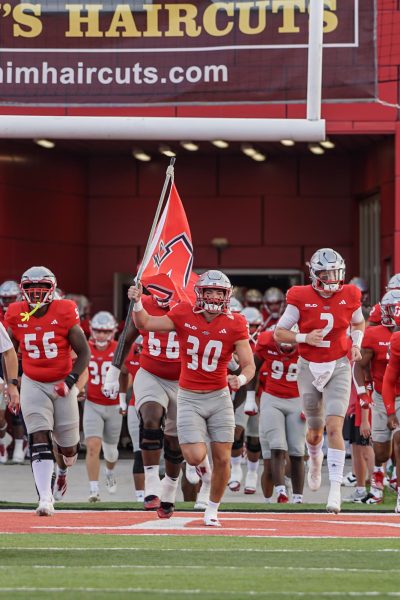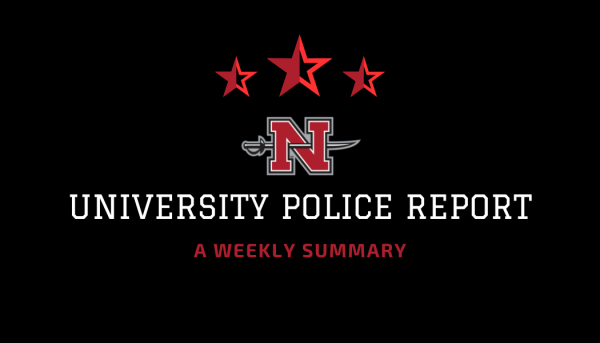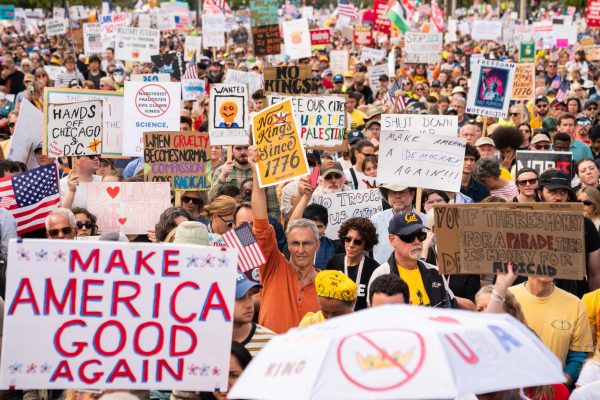C.R.O.W.N. Event: Black health and wellness panel
Photo by: Rodney Woods
To kick off Black History Month this spring semester, the Colonels Retention of Winners Network (C.R.O.W.N.) at Nicholls State University held a panel discussion concerning black health and wellness.
This discussion was held Tuesday, Feb. 1 at noon in the Mary M. Danos Theater in Talbot Hall. The panelists were: Elnora Parker Vicks, the Counselor and Outreach Coordinator for Nicholls; Steven H. Kenney, Jr., the Human Resources and Chief Diversity and Inclusion Officer; nationally certified counselor and licensed therapist Gill Jasmine; and Nicholls’ Fitness and Health Coordinator Jarian Johnson. The event was moderated by Lashawn Lewis, a senior C.R.O.W.N mentor from St. James Parish.
The panel’s purpose was to further the conversation about black health and wellness, and discuss the idea of envisioning a better future for those in the black community. The panelists were asked a few questions, first by the moderator, and then by the audience. Refreshments were served afterward.
Each of the panelists were faced with interesting questions about the importance of health and wellness in the black community. All of them provided unique answers to every question. Not even seventy years ago, the black community was living in a segregated America, and to this day, many find it difficult to bring awareness to black mental health.
Panelist Vicks specifically stressed the importance of “bridging the gap” and finding more ways to work toward a solution to the problem. Statistically speaking, people in the black community tend to be more at risk when it comes to health factors, such as hypertension. The positive outcome is that, nowadays, black people have a lot more access to health resources, though these opportunities were not always available to them.
When asked what they think of when they think about black health and wellness, Vicks explained how she sees the benefit in having topics like health and wellness so readily accessible through social media. Many influencers are using their platform to spread messages of the importance of health and wellness. They’re acknowledging that, since taking care of yourself is often a learned behavior, it is important that the black community take their health more seriously. Kenney, Jr. reminded the audience that health and wellness is a journey, not just the “here and now”. Panelist Johnson stated that anyone can make a simple change in bettering themselves, and that “it is time for black people to reclaim their health”. He goes on to stress the importance of balance, and the need to chase better habits rather than results. Johnson explained, “It takes willpower, determination, and knowing where you want to go.”
The panelists were then challenged with the question of what they would like to see change in the black community. Their answers were, once again, both educating and inspiring.
Kenney, Jr. believes that the community oftentimes rely on the information they hear, rather than doing their own research. Having been accustomed to learning by hearing through spirituals and other cultural traditions, Kenney, Jr. wants the community to utilize the resources available to them for information instead of only trusting the outdated experiences of others.
Vicks personally desires to break down the “superwoman” stereotype mostly associated with black women. She would also like to deconstruct the stigma around black men not being allowed to openly express their own emotions.
Similarly, panelist Jasmine wishes to destroy the stigma surrounding mental health in the community, and rid the mentality that you must be “the strong one” for everyone else, while no one is being the strength for you. This struggle often leads to a lonely, exhausting life for many in the black community.
Kenney, Jr. stated, “Check in with your strong friends because you never know who really needs help.”
On the topic of how to better promote black mental health, the panelists talked entirely about normalizing the conversation. It is important to be candid and transparent in order to berid the stigma surrounding mental health and suicide. Though eating right and working out are important to take care of the physical self, it is just as important to take care of your mental self. Kenney, Jr. stated in regard to the black community, “We are progressing, but not as fast as we should be. African American men are still the leading demographic when it comes to suicide.”
Vicks explained how the behavior of surpressing emotions, specifically in the black community, dates back to slavery when many people were forced to do so. Even in today’s society, there is still so much judgment and bias toward black men expressing themselves and their emotions. While the information and resources are out there, the majority are still afraid to reach out—a phenomenon that Vicks herself has coined the “silent but deadly depression of black men”. She said, “We have to meet our people where they feel safe.”
Johnson brought up an interesting point that the black community often feels safe in barbershops and beauty salons. While you often see it as a trope on television, it can be true for many in the black community to seek places, such as these, as a safe space with lively culture, to talk to people they can relate to. It is said that eighty percent of the black community will not seek mental help because of the stigma surrounding it. This statistic further proves why having safe, non-judgemental spaces in the black community is so important. Because of the wide world of social media, Johnson states how he personally feels about new podcasts popping up and creating similar conversations that feel just as safe and welcoming.
The last question for the panelists concerned the healthcare system in today’s America. Kenney, Jr. believes that as an individual everyone has the opportunity to research and do what they feel is best for them, especially since information these days is so readily available. Each panelist discussed the mistrust that the black community may have with the healthcare system, but assured, rather than fearing something you do not understand, it is vital to create a safe space to learn, listen, and reduce any fears or mistrust you may have. Vicks stressed the importance of advocating for the black community to get the treatment they need, and for each and every person to allow themselves the capacity to be well-informed and well-educated in our healthcare system.
Jasmine stated on behalf of these issues, “There’s no excuse to be doing the same old things in a more modern, accessible world. Hold yourself accountable and get a doctor who you feel would better understand you and what you go through.”
Following this discussion was a “Q&A” session with the audience, so anyone had an opportunity to ask the panelists their own questions.
This is an important conversation to have, especially on a college campus, where so many people from different backgrounds and communities come together to coexist. Envisioning a better future and working to increase the health and wellness of the black community is a movement worthy of discussion and celebration.
This Black History Month, Nicholls State University is packed with: events from the above panelists, awareness tables in the Bollinger Student Union, and spiritual performances in the Mary M. Danos Theater.
Carry on the conversation in hopes that resources continue to become more available and the welfare of the black community may continue to thrive.

My name is Evan Elizabeth Cressoine. I’m a junior here at Nicholls, from Houma, studying creative writing. Above all, I am a storyteller. I’ve been...


